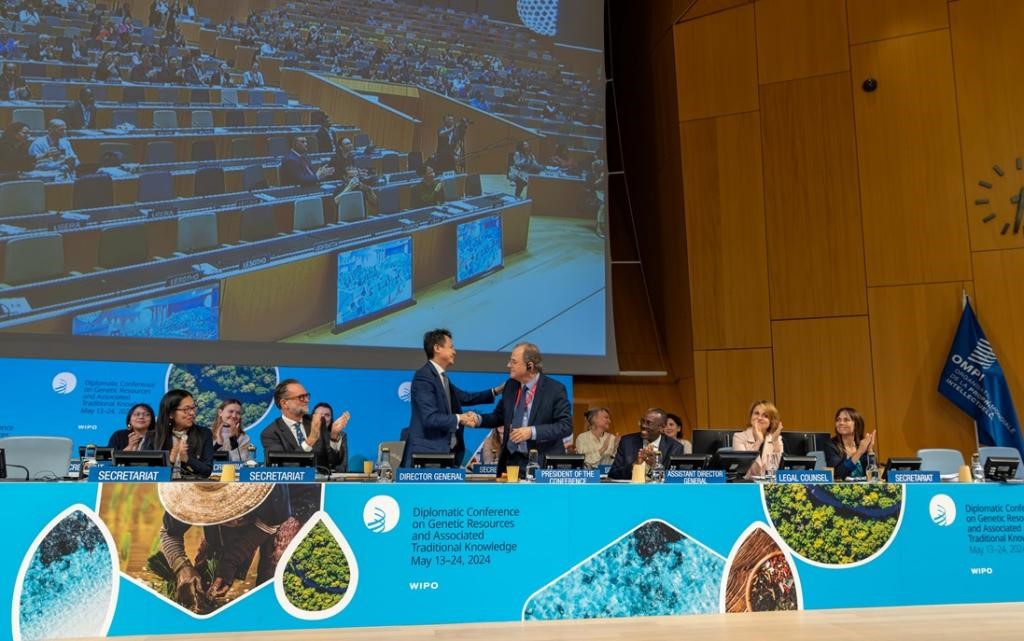World Intellectual Property Organization (WIPO) Meeting 2024

- 25 May 2024
Why is it in the News?
The Treaty on Intellectual Property, Genetic Resources and Associated Traditional Knowledge was adopted at the Diplomatic Conference held under the aegis of the World Intellectual Property Organization (WIPO) at its headquarters in Geneva recently.
What is the WIPO Meeting 2024?
- The World Intellectual Property Organization (WIPO) Meeting 2024 focuses on final-stage negotiations for a proposed treaty on intellectual property, genetic resources, and associated traditional knowledge.
- The aim is to protect the rights of communities that conserve genetic resources and hold traditional knowledge of their use.
- The main goal of the treaty is to enhance the efficacy, transparency, and quality of the patent system regarding genetic resources and traditional knowledge.
- It aims to prevent patents for non-novel or non-inventive inventions and ensure proper disclosure of genetic resources and traditional knowledge in patent applications.
Key challenges in the negotiations:
- Key challenges include reaching a consensus on mandatory disclosure requirements, addressing biopiracy, deciding on the inclusion of DSI in the treaty, and defining traditional knowledge.
- Countries like the United States, Japan, and South Korea generally oppose mandatory disclosure requirements, adding complexity to the negotiations.
What are genetic resources and traditional knowledge associated?
- Genetic resources are genetic material of actual or potential value found in plants, animals, and microorganisms.
- These resources are essential in fields like agriculture, pharmaceuticals, and biotechnology.
- Traditional knowledge associated with genetic resources refers to the knowledge, practices, and innovations of indigenous and local communities, developed and passed down through generations.
- This knowledge is often related to the use and conservation of genetic resources.
What is Biopiracy?
- Biopiracy refers to the unauthorized use and patenting of genetic resources and traditional knowledge without proper compensation or acknowledgement to the communities that developed and conserved them.
- The treaty seeks to address biopiracy by requiring the disclosure of genetic resources and traditional knowledge in patent applications and aligning with international agreements like the Nagoya Protocol.
What is Digital sequence information (DSI)?
- Digital sequence information (DSI) refers to the digital representation of genetic material.
- The treaty currently excludes DSI from its scope, which is a point of contention as it affects the management and protection of genetic resources.
- Including DSI in the treaty is under debate to ensure comprehensive protection.
Outcomes and Significance of this Meeting:
- Expected outcomes include finalizing the treaty's text, agreeing on substantive intellectual property provisions, and administrative issues.
- Once finalized, the treaty will be open for signature and aims to provide a robust framework for protecting genetic resources and traditional knowledge.
- The treaty also aims to protect the rights of indigenous and local communities by ensuring they receive fair compensation and recognition for their genetic resources and traditional knowledge.
- It also promotes the sustainable use and conservation of these resources, benefiting both global and local communities.
- The treaty has broader implications for international intellectual property law, biodiversity conservation, and the rights of indigenous and local communities.
- It aims to balance the interests of patent holders with the need to protect and sustainably use genetic resources and traditional knowledge.
India’s Role:
- India plays a significant role in the negotiations by advocating for strong disclosure requirements and a clear definition of traditional knowledge.
- India's participation helps ensure that the treaty provides sufficient policy space for countries to maintain their current stronger disclosure requirements under national laws.
